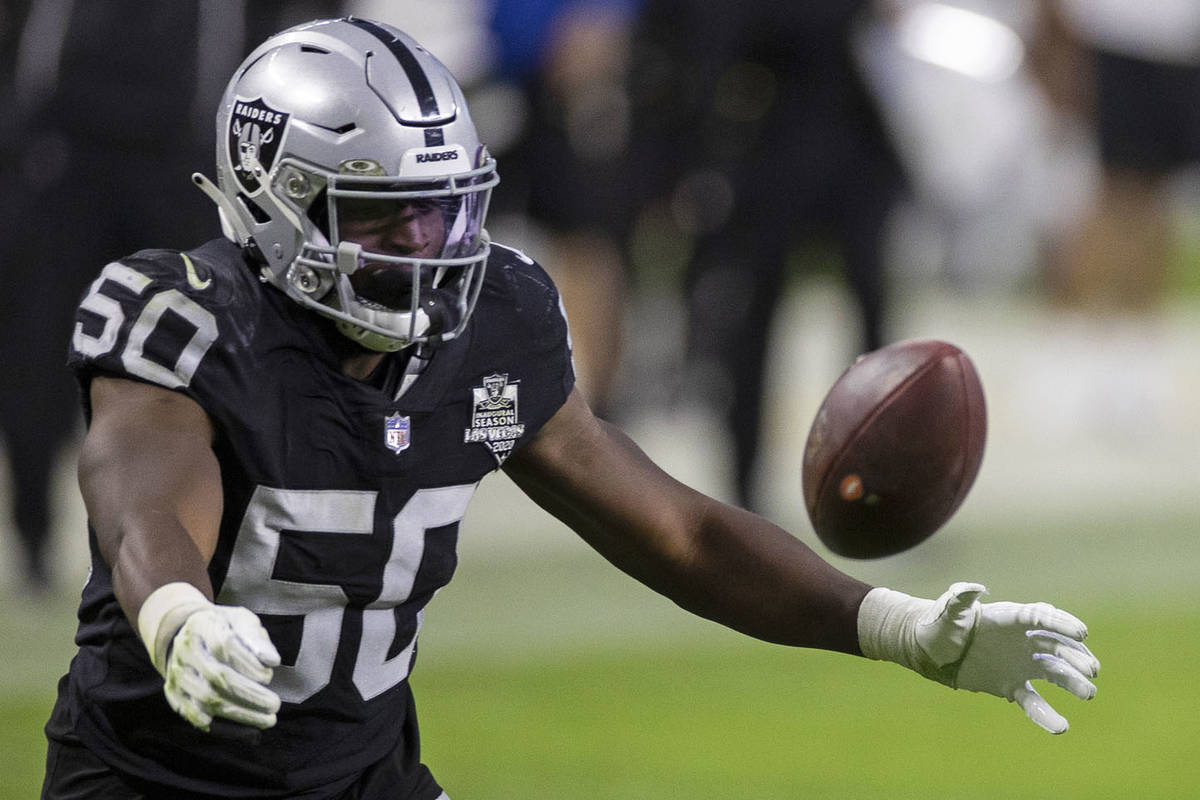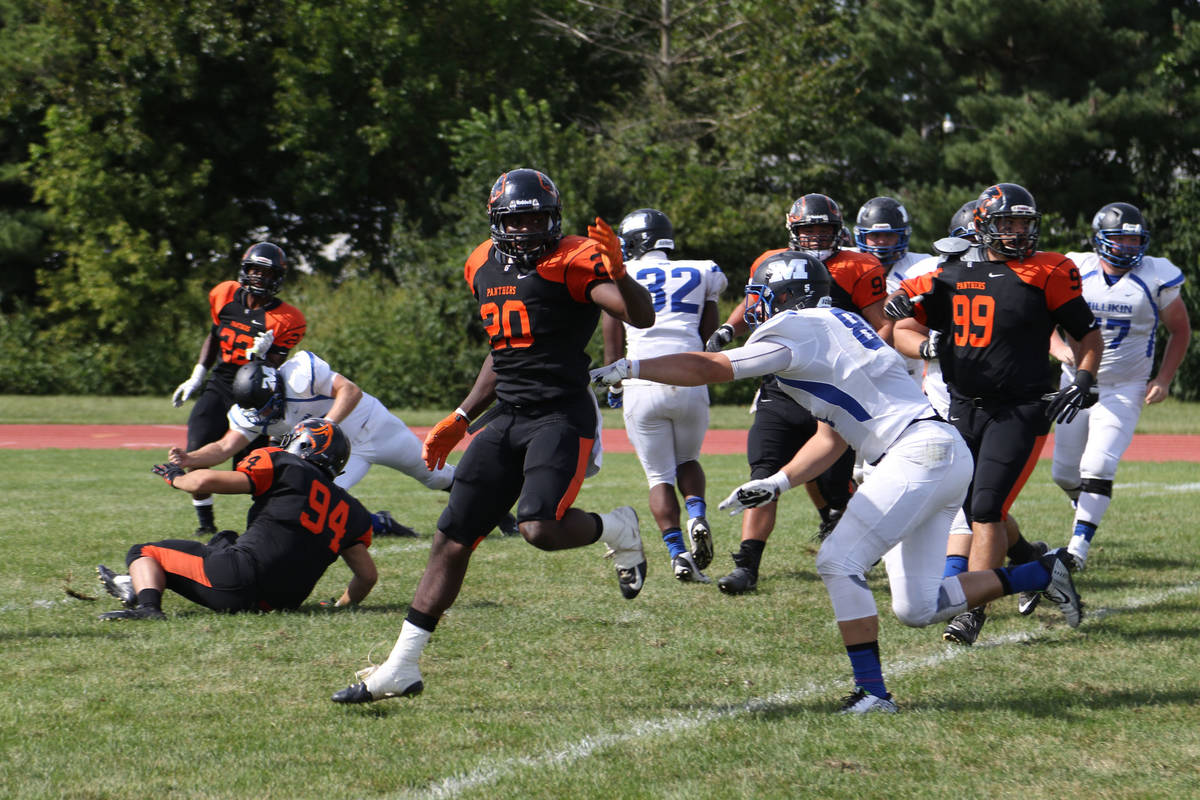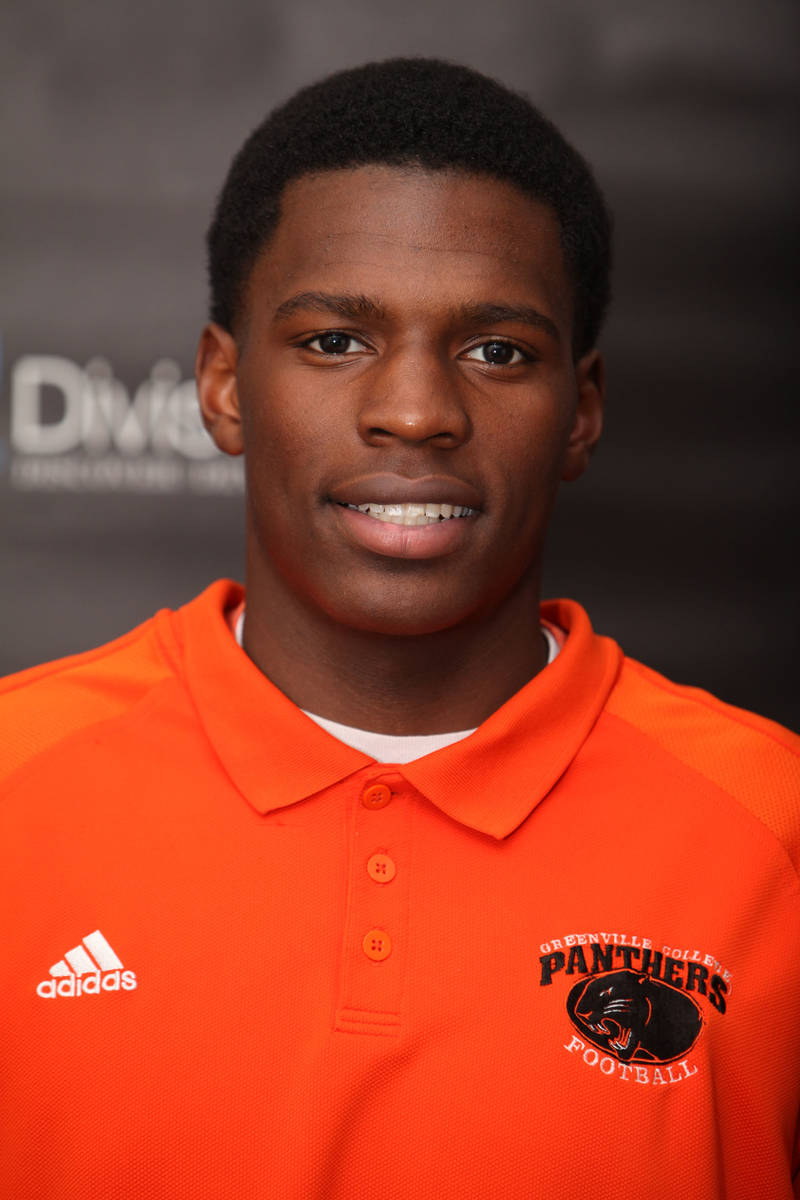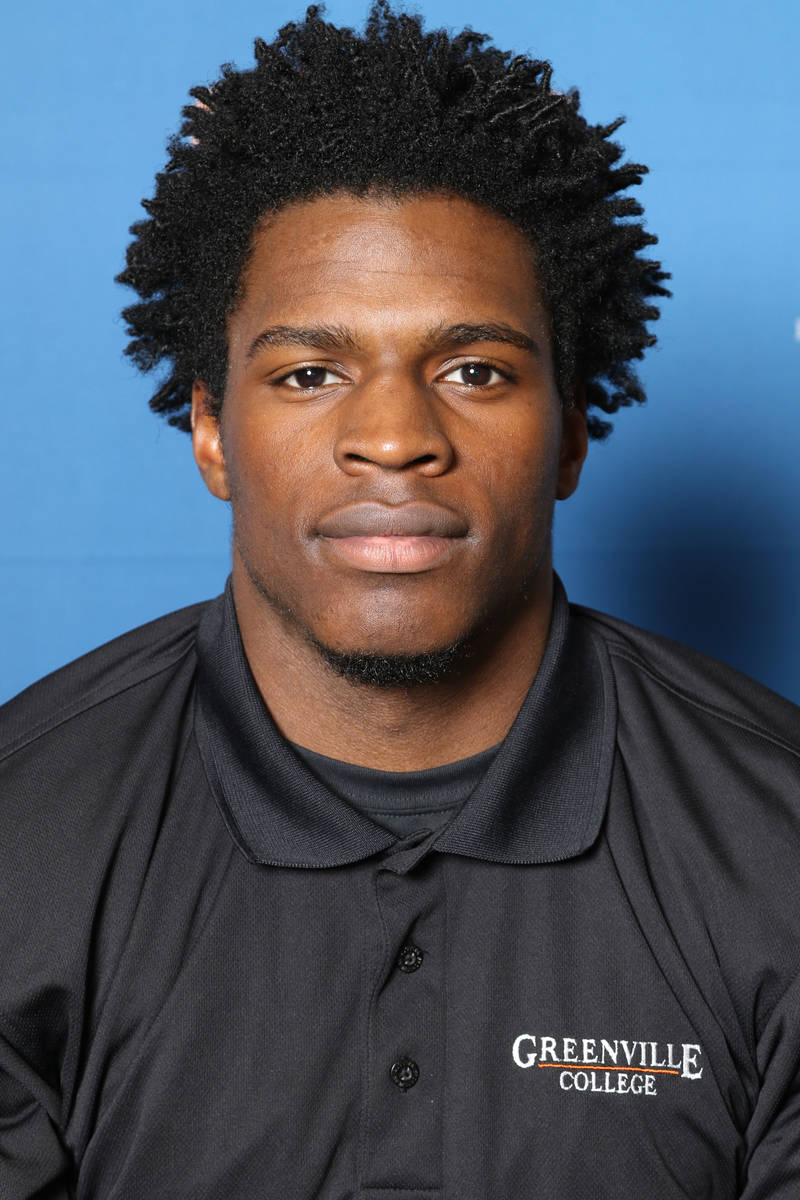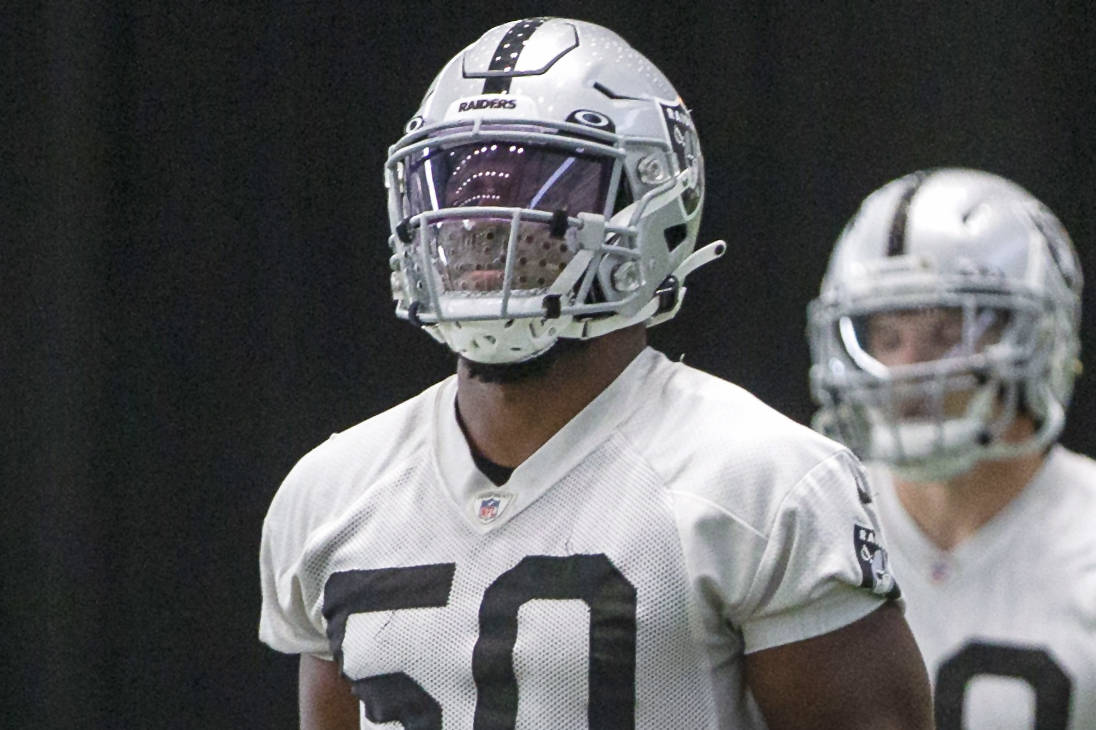Raiders LB Nicholas Morrow’s long, winding road to NFL
It was the afternoon of Oct. 11, 2014, and Nicholas Morrow was frustrated.
Why, he wondered, is the game official allowing Crown College’s tight end to hit me after the whistle — play after play after play? Why is he refusing to throw his flag?
Morrow asked, but the official remained coy, offering counsel instead of an answer. “Keep a cool head,” he repeatedly told Morrow, then a sophomore linebacker at Greenville College. “Cool heads prevail.”
Determined ones as well.
He tried to disregard the tight end’s antics. And when Crown ran a lead running play early in the fourth quarter, Morrow pounced. He slipped a block by the tight end, punched the football free from the running back’s hands and ran 30 yards for a touchdown en route to a 35-17 victory.
The official did a lot more talking on the ensuing defensive series, telling him, among other things, to “do what you’ve got to do so you can make it” to the NFL.
The comment took Morrow by surprise. Looking back, he said it was the first time he seriously considered the idea.
Six years later, Morrow, now 25, is in his fourth year with the Raiders. He’s a fixture in their linebacking corps and one of the most productive players on their defense.
He was backup offensive lineman until his senior year in high school, and even then a concussion stalled whatever recruiting momentum he’d hoped to generate — relegating him to the Division III level and Greenville, Illinois, a tiny town of 6,453 known as much for its prison as its football team.
But his faith never wavered. In God, himself and the grind. And he eventually prevailed, transforming himself from an undersized, inexperienced linebacker into a valuable starter for one of the NFL’s most storied franchises.
“Nobody gave him a snowball’s chance in hell to make it to the NFL,” said Tony Woods, one of Morrow’s former coaches at Huntsville High School in Huntsville, Alabama. “But he believed in himself. He bet on himself.”
Stuck on the bench
Morrow’s father, Lloyd, is a minister. His mother, Erika, teaches special education. They raised Morrow in Huntsville to be devoted to his faith — and anything else he does in his life.
“Whatever you put your hand to, stick with it. Good or bad, mold it to the best of your ability,” says Morrow’s father, who pastors at Temper Tabernacle Church and works as the director of nutritional services at a local hospital. “He really applied his work ethic to his school work, just to anything he did, he was really committed to it.”
Morrow began playing football as an elementary school student and was a timid, tentative tackler who shied away from the contact he now embraces. But that was nothing a session in the backyard with dad couldn’t fix.
“I’d tackle him, of course not hard, but to get him accustomed to getting hit and not afraid he’d being hit,” the elder Morrow said.
Even then, his passion was palpable.
Morrow was also active in the middle school marching band as the lead percussionist and was faced with a choice when he enrolled in high school — football or band?
He chose football, making band a casualty of the glory he’d someday have on fall Friday nights. Or so he thought, anyway, until he became an undersized offensive lineman tasked with backing up All-American guard Grant Hill, who went on to play at Alabama.
“I hated it,” Morrow said.
Yet he remained undeterred by his lack of playing time. He figured he would play eventually, even in college, so long as he showed up to practice and put forth his best effort.
Woods coached linebackers and recruited Morrow to play defense during his senior season of 2012, thereby changing the trajectory of his career. He also played tight end that season and compiled enough promising game film to garner the attention of the Greenville coaches, who discovered him through Next College Student Athlete — a recruiting service that connects prospective student-athletes with college coaches.
Another Division III program, Huntingdon, in Montgomery, Alabama, showed interest in Morrow. As did Sterling College, an NAIA school in Sterling, Kansas. But Morrow said “Greenville was the only one serious” about his recruitment. So Greenville is where he would go, albeit begrudgingly.
“I didn’t want to go,” Morrow confessed. “My pops actually made me.”
Greenville’s finest
There’s not much to Greenville. The town, or the university. Morrow actually mistook the local prison, FCI Greenville, for the campus during his official visit. Farmland flanks the roads that lead to the tiny city. Hence his initial trepidation.
But Greenville offered Morrow an opportunity to continue his football career and education. Plus, it’s a Christian college, a bonus in his father’s eyes. He enrolled with the intention of playing on the varsity right away. Not on the junior varsity like an upperclassmen suggested during his first few days on campus.
“If I’m going to pay to play football, I’m going to be the best possible player I can be,” Morrow said, explaining his mentality. “I always said that if I’m going to be in the NFL, I understand that Division III football is not the most competitive football. … I said ‘You know what, I’m going to bring the NFL to me. Everything I did, I tried to intensify and make it as focused as possible.”
Morrow outperformed seniors in his first fall camp, played five games during his freshman season and cultivated during his first collegiate offseason a routine that he’d maintain for the rest of his college career.
He wanted to get faster, so he trained with the school’s sprint coach in between afternoon classes. He wanted to become more explosive, so he trained with the high jumpers at track practices.
He lifted weights on his own and with the team. In the evenings, he’d do plyometrics. He’d run to and from workouts, regularly exceeding two or three miles per round trip.
When he wasn’t in class, running, jumping, or lifting, he was watching film. By himself or with his coaches, and more often than anyone else on the team.
He showed up every season bigger, faster, stronger and smarter than he was the year before. When he’d go home to Huntsville for breaks, he’d be out of the house by 5:30 a.m. to attend workouts at a local gym.
“The amount of work he did on top of what we had for him was just amazing,” said Greenville coach Robbie Schomaker. “His work ethic is something I don’t think I’ve seen before.”
Morrow solidified himself as the team’s best player by the beginning of his junior season, and with the official’s remark in mind, he confided in Schomaker that he wanted to play in the NFL. So the coach helped arrange a junior day workout before a Chicago Bears scout at McKendree University, a Division II school in nearby Lebanon, Illinois.
He ran the 40 yard-dash, Schomaker said, in 4.5 seconds and outclassed the Division II players in attendance.
By his senior season, he weighed 225 pounds and was faster than the wide receivers and stronger than all the linemen. Schomaker said most of Morrow’s teammates were intimidated by him, sparking rare frustration from the cool-headed superstar.
“There were only a handful of guys who would challenge him and make him work,” Schomaker said, save for the practices that the NFL scouts attended. Morrow’s teammates practiced harder with an audience. If only they competed like that all season.
More than 20 NFL teams sent scouts to Greenville to watch Morrow during his senior season, validating his unwavering commitment to his craft. He concluded his college career in 2016 as Greenville’s first All-American and the Upper Midwest Athletic Conference’s MVP.
“You could tell that he was totally different than anyone else out there,” Crown coach John Auer said. “He could basically do whatever he wanted to.”
An every down linebacker
Morrow opted to withdraw from Greenville during the spring semester of his senior year. He needed to focus on football and the school didn’t have the requisite resources to best prepare him for the pros.
So he moved to Indianapolis to train at a facility called SPARTA Indy alongside the likes of Indianapolis Colts cornerback Kenny Moore and Jacksonville Jaguars wide receiver Keelan Cole, who also played at smaller colleges. He quickly adapted to a new routine that included more rigorous workouts and extensive film study.
“It was basically training camp,” Morrow said. “It was just football all day, which is fun to me.”
Morrow did not attend the NFL’s annual scouting combine in Indianapolis. He participated instead at Northwestern’s pro day. Some NFL teams wanted him to play safety. Some, like the Raiders, wanted him to play linebacker.
The Raiders were the first team to contact Morrow upon the conclusion of his college career — and one of the two teams to call him after the 2017 NFL draft, the other being the rival Chiefs. Morrow said he considered signing with Kansas City before ultimately deciding on Oakland, where he thought he’d be a better fit.
He signed as an undrafted free agent on May 4. 2017.
“Once he got there, I said ‘Man, you’re playing ball with a bunch of guys that played at Division I schools,’” said Morrow’s father. “‘These guys had 10 times the resources, 10 time the amenities.’ I said ‘You really went to the pros with high-school resources. … To jump from that to the pros and to make the 53-man roster above guys who came from D-I schools, that’s huge.’”
Morrow had one simple goal as he began his rookie season: make it hard for the Raiders to let him go. He knew Greenville’s defensive schemes and terminologies were elementary compared to those he’d need to learn at the NFL level, so he arrived to practice early and stayed late, pouring over game tape and his playbook “to catch up to everyone else.”
The Raiders could not afford to let him go. Morrow started five games as a rookie in 2017 — logging 53 percent of the team’s defensive snaps and flashing the potential that’s since made him a fixture.
“He’s handled his success like a pro,” said Morrow’s agent, Brian Hamilton of Plan B Sports Management. “Often times, guys just need opportunities and for the staff to have faith in them. Nicholas received an opportunity, and he’s run with it.”
Morrow has started 10 games this season and is third on the team with 67 tackles. His seven tackles for loss are second to only Maxx Crosby. His nine pass deflections are second to only Johnathan Abram. He’s adept at playing the run and even better against the pass, allowing a passer rating of 80.3 — third on the team among defensive backs and linebackers.
Raiders coach Jon Gruden has praised him throughout the course of the season.
“He’s such a great kid, coming from a real small school. Quite a transition for him, changing coaches, changing systems,” Gruden said. “I think he’s going to be a really good linebacker in this league.”
Morrow paid off his student debt during his second NFL season and plans to someday complete his biology degree, needing a mere 12 credits to graduate from Greenville. He plays now at Allegiant Stadium and practices at the luxurious Intermountain Healthcare Performance Center in Henderson, but still fondly remembers the games at Greenville before 125 or fewer fans.
He’s forever grateful he gets paid to play a game he once paid to play, cherishing the lessons he learned at the Division III level in that tiny town in central Illinois.
“It taught me what it meant play for the love of the game … That’s literally all I was playing for. It was no guarantee to go to the NFL,” he said. “So that way when the praise and the accolades come…you’re still playing because you just love the game.”
Always and forever.
Contact reporter Sam Gordon at sgordon@reviewjournal.com. Follow @BySamGordon on Twitter.



